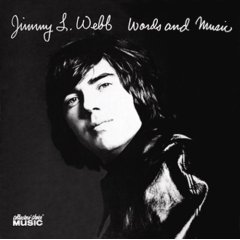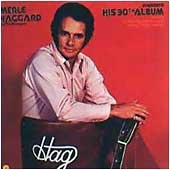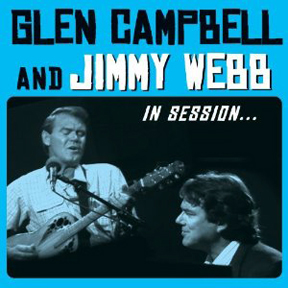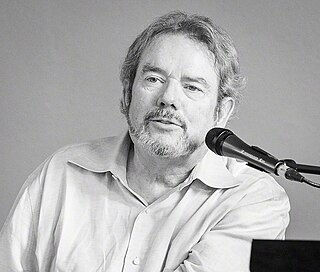
The Naked Ride Home is the twelfth album by American singer-songwriter Jackson Browne, released in 2002. It peaked at number 36 on The Billboard 200 chart. The single "The Night Inside Me" reached number 25 on the Adult Contemporary chart.

"MacArthur Park" is a song written and composed by Jimmy Webb. Richard Harris was the first to record it in 1968; his version peaked at number two on the Billboard Hot 100 chart and number four on the UK Singles Chart. "MacArthur Park" was subsequently covered by numerous artists, including a 1969 Grammy Award for Best Country Performance by a Duo or Group with Vocal-winning version by country music singer Waylon Jennings and a number one Billboard Hot 100 disco arrangement by Donna Summer in 1978.

"Wichita Lineman" is a song written by the American songwriter Jimmy Webb in 1968. It was first recorded by the American country music artist Glen Campbell with backing from members of The Wrecking Crew and was widely covered by other artists.

Words and Music is the second album by American singer-songwriter Jimmy Webb, released in 1970 by Reprise Records. This was the first album authorized by the artist.

Letters is the fourth album by American singer-songwriter Jimmy Webb, released in 1972 by Reprise Records.Letters was a more sedate, piano-oriented album than its predecessors, and soaked in the influence of Webb's peer and eventual close friend Joni Mitchell. "I was tremendously influenced by Joni Mitchell," he admitted to Peter Doggett of Record Collector in 1994. "She was a good friend, and I was fortunate enough to be around her when she was working on For the Roses and Court and Spark. We were just part of each other's lives for a while. I definitely envied that part of her work -- the idea that this is just a conversation you're listening in on. It can still be poetry, but not self-conscious or forced poetry. I got extremely under her spell as a writer -- I still am. I used to go to the studio and listen to her record, sit quietly in the back of the control room. After the Beatles, Joni was the next big blip on my radar screen, in terms of, 'Hey, pay attention: this girl is doing something a little bit different.'" Mitchell's longtime engineer Henry Lewy also did some engineering work for Letters as well.
"Highwayman" is a song written by American singer-songwriter Jimmy Webb, about a soul with incarnations in four different places in time and history: as a highwayman, a sailor, a construction worker on the Hoover Dam, and finally as a captain of a starship. The song was influenced by the real-life hanged highwayman Jonathan Wild. The dam builder verse alludes to the deaths of over one hundred men during the construction of Hoover Dam near Boulder City, Nevada. Webb first recorded the song on his album El Mirage, released in May 1977. The following year, Glen Campbell recorded his version, which was released on his 1979 album Highwayman. In 1985, the song became the inspiration for the naming of the supergroup The Highwaymen, which featured Johnny Cash, Waylon Jennings, Willie Nelson, and Kris Kristofferson. Their first album, Highwayman, became a number one platinum-selling album, and their version of the song went to number one on the Hot Country Songs Billboard chart in a twenty-week run. Their version earned Webb a Grammy Award for Best Country Song in 1986. The song has since been recorded by other artists. Webb himself included a different version on his 1996 album Ten Easy Pieces, a live version on his 2007 album Live and at Large, and a duet version with Mark Knopfler on 2010 album Just Across the River.

"Workin' Man Blues" is a song written and performed by American country music artist Merle Haggard and The Strangers. It was released in May 1969 as the second single from the album A Portrait of Merle Haggard. The song was released during his early peak and became one of several signature songs during his career.

Twilight of the Renegades is the tenth album by American singer-songwriter Jimmy Webb, released in August 2005 by Sanctuary Records.

Angel Heart is the seventh album by American singer-songwriter Jimmy Webb, released in April 1982 by Real West Production.

Reunion: The Songs of Jimmy Webb is the twenty-seventh album by American singer and guitarist Glen Campbell, released in 1974.

Merle Haggard Presents His 30th Album is the seventeenth studio album by American country singer Merle Haggard and The Strangers, released in 1974. Contrary to the album's title, this was his 17th studio album; however, the number 30 included his six collaborative albums, three live albums, one 'live' gospel album, one Christmas album, and two greatest hits compilations up to that point.
American country music singer Glen Campbell released fifteen video albums and was featured in twenty-one music videos in his lifetime. His first two music videos, "By the Time I Get to Phoenix" and "Wichita Lineman", were directed by Gene Weed in 1967 and 1968 respectively. Campbell released his final music video, "I'm Not Gonna Miss You", in 2014 to coincide with the release of the documentary Glen Campbell: I'll Be Me.
"All I Know" is a song written by American songwriter Jimmy Webb, first recorded by Art Garfunkel on his 1973 debut solo album, Angel Clare, released by Columbia Records. Instrumental backing was provided by members of the Wrecking Crew, L.A. session musicians. Garfunkel's version is the best known and highest-charting version, peaking at number nine on the Billboard Hot 100 and number one on the Easy Listening chart for four weeks in October 1973.

Songs from the Road is a live album by Canadian singer-songwriter Leonard Cohen. Released on September 14, 2010, it is his twentieth album.

The Animals' Christmas is the sixth solo studio album and the first Christmas album by vocalist Art Garfunkel, released in December 1985 by Columbia Records. The album was written by Jimmy Webb and features vocals by Garfunkel, Amy Grant, and Wimbledon King's College Choir. The Animals' Christmas tells the story of the Nativity of Jesus from the perspective of the animals present. The album received positive reviews, with one writer calling it "one of the best Christmas albums of the '80s."

Just Across the River is the twelfth album by American singer-songwriter Jimmy Webb, released in June 2010 by Koch Records. The album features thirteen classic Jimmy Webb tunes performed by Webb with guest appearances by friends, collaborators, admirers, and fellow recording artists Linda Ronstadt, Jackson Browne, Billy Joel, Willie Nelson, Glen Campbell, Michael McDonald, Mark Knopfler, J.D. Souther, Vince Gill, and Lucinda Williams.

Glen Campbell and Jimmy Webb: In Session is the sixty-second album by American singer-guitarist Glen Campbell—a collaborative album with Jimmy Webb—released in September 2012 by Fantasy Records. The album and its accompanying DVD were filmed, taped, and recorded live in December 1988 in the Hamilton, Ontario studios of CHCH-TV as part of the Canadian concert series In Session.

Didn't We is a song recorded by Irish singer and actor Richard Harris for his debut studio album, A Tramp Shining (1968). It was written and produced by Jimmy Webb and originally served as the B-side to Harris' 1968 single "MacArthur Park". "Didn't We" was then distributed as the record's single by Dunhill Records, also in 1968. A traditional pop song, Harris sings about his life in the past. Commercially, it charted at lower positions of both the United States and Canada, and in the higher ranks of their Adult Contemporary component charts. Harris featured "Didn't We" on several of his greatest hits albums, including The Richard Harris Collection: His Greatest Performances from 1973. That same year, the song was reissued as a promotional single paired alongside his 1971 single "My Boy".
"Reconsider Me" is a single from Warren Zevon's 1987 album Sentimental Hygiene. The song failed to chart, but became a live staple in Zevon's concert performances. In 2006, a set of love songs were released under the name: Reconsider Me: The Love Songs.
















